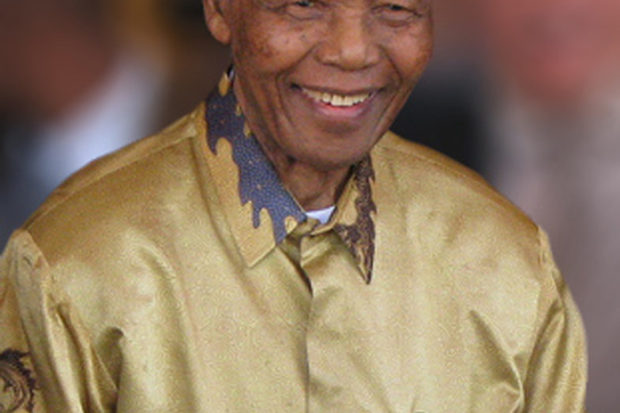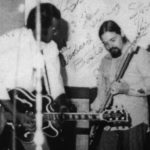
By Boston Woodard

Much has been written and said about Nelson Mandela since his passing on Dec. 5, 2013, at 95. President Barack Obama called Mandela “a giant in history” as he talked about the life of the late African leader. During a memorial ceremony, Obama thanked the people of South Africa for “sharing him with us.”
Mandela spent 27 years in prison as a political prisoner (#46664) for his courageous part in fighting against racial injustice. Most of that prison time was served on Robben Island. His life and existence on the island was a lesson in dignity, survival and courage.
For 25 years after his trial, there was a silence born out of fear when Mandela’s name was brought up in South Africa. According to a passage from his book Nelson Mandela by Himself, his name was “uttered virtually only in secret or in defiance of the increasingly repressive tactics of the apartheid regime and its agents.”
From a conversation with Richard Stengel on March 9, 1993, Mandela said, “Once you have rid yourself of the fear of the oppressor and his prisons, his police, his army, there is nothing that they can do. You are liberated.”
Mandela was a South African anti-apartheid revolutionary, politician and philanthropist who served as president of South Africa from 1994 to 1999. He was South Africa’s first Black president—the first elected in a fully representative democratic election.

His government focused on dismantling the legacy of apartheid by focusing on racism, poverty and equality. Mandela’s life during his prison time was dedicated to giving hope to the oppressed.
Robben Island got its name from the Dutch word for seal, as hundreds once populated the cold Benguela tides that lapped the island’s beaches. Robben Island was turned into a leper colony, an insane asylum and later a military base. The island’s coastal beauty was spoiled by the harsh discipline and politics under the South African apartheid system. Mandela had a choice to make, and that choice was to never be intimidated by the forces of the apartheid oppressors.
Watani Stiner, by all accounts, a political prisoner in San Quentin, put a local viewpoint on some of the legacy Mandela left behind and the circumstances Mandela faced while in prison for 27 years. Stiner is a staff writer with the San Quentin News and is the person behind the monthly “OG” column.
“I draw inner strength from Madiba [a term of respect] knowing that Mandela viewed his capture and unjust imprisonment not as a defeat, but as a delayed victory,” Stiner said.
In 1969, as an activist in the Black Power Movement and a member of the Black Nationalist organization “Us,” Stiner was convicted of conspiracy to commit murder in a tragic shootout on the UCLA campus that claimed the lives of two Black Panthers, John Jerome Huggins and Alprentice “Bunchy” Carter. He received a life sentence.
Intimidation by the “warders” (as guards were called) of Robben Island was a tool frequently used to remind prisoners that they were in charge of their lives and everything they did. Mandela believed that fear could not be part of the insurgency against apartheid. After all, it was fear that fueled it.
As it was with Steve Biko, father of South Africa’s Black Consciousness Movement, Nelson and Winnie Mandela’s spirit of struggle and personal sacrifice were sources of inspiration for oppressed people everywhere.
In the quarter-century following the end of the trial on June 12, 1964, a silence born of fear more or less hung over the name Nelson Mandela within South Africa. For decades, it was uttered virtually only in secret or in defiance of the increasingly repressive tactics of the apartheid regime and its agents. Some of his words were smuggled out of prison and released by the African National Congress (ANC) in exile, but Mandela effectively had been silenced.
At the British Red Cross Humanity Lecture at the Queen Elizabeth Conference Center in London on July 10, 2013, Mandela said, “Those who conduct themselves with morality, integrity and consistency need not fear the forces of inhumanity and cruelty.”
Because Mandela was a political prisoner, he was faced with a torrent of insults and indignities upon his arrival on Robben Island. “Dis die Eiland Hier gaan julle vrek!” (This is the island where you will die), his warders told him.
Mandela said the warders always spoke in Afrikaans. If a prisoner replied in English, they would say, “Ek verstaan nie daardie kafferboetie se taal nie” (I don’t understand that kaffir-lover’s language).
According to Stiner, the word kaffir Mandela refers to in South Africa is equivalent to the “N” word in America. This negative epithet was frequently used to insult or intimidate prisoners in their charge.
Mandela understood the importance of making the warders believe that they were indeed in complete control. Ingratiating themselves to the warders had its advantages according to Mandela because freedom and equality to an entire nation were what was at stake.
The impact Mandela’s struggle had on prisoners around the world was not only inspiring but also educational. According to a CNN description, Mandela was a “freedom fighter, prisoner, moral compass and South Africa’s symbol of the struggle against racial oppression.”
Prisoners around the world listened to Mandela’s words. The heart and courage necessary to endure the torment of inhumane and intimidating circumstances germane to Robben Island prison was inspirational. American prisoners studied and learned from his writings. He became an inspirational mentor to countless detainees all over the world.
On a personal note, during one of my several stints in isolation specifically for my “journalistic activities,” I nearly missed my opportunity for a book off a small wooden cart pushed passed the cells once a week. One book was allowed. I wasn’t standing at my door. The guard said he would give me a book this time, but I was to be ready next time or there’d be no book.
As he walked back to the cart I asked him to give me something thick, a large book that I could read over a week’s time. He opened the metal food-slot in the door and handed me Mandela’s Long Walk to Freedom autobiography—a source of inspiration and guidance I would refer to many times over the years.
Freedom of expression was important to Mandela. He believed that having the liberty to speak out without fear was paramount to freedom itself. He said that a critical, independent and investigative press is necessary for any democracy.
“The press must be free from state interference. It must have the economic strength to stand up to the blandishments of government officials,” said Mandela.
At the International Press Institute Congress on Feb. 14, 1994, Mandela said, “[Freedom of expression] must have sufficient independence from vested interests to be bold and inquiring without fear or favor. It must enjoy the protection of the constitution, so that it can protect our rights as citizens.”
On Mandela’s long struggle to achieve freedom, prisoner Stiner said we should stay mindful that “we, who now honor and celebrate the life and struggle of Nelson Mandela, must avoid the convenient extrapolation and sanitization of his legacy.”
Until Mandela’s Long Walk to Freedom is read, it’s easy for prisoners anywhere to take for granted the importance of living conditions, legal access, sustenance, education and the right to freedom of expression in this country. The book completely explains who we are as prisoners.
One of the most important decisions Mandela made when he was still on Robben Island, as he recalled it, was, “As I walked out the door toward the gate that would lead to my freedom, I knew if I didn’t leave my bitterness and hatred behind, I’d still be in prison.”
*****
Boston Woodard is a prisoner/journalist who writes for the Community Alliance newspaper. His articles have appeared in various publications throughout California. Boston is the author of Inside the Broken California Prison System, which is available at www.Amazon.com, www.humblepress.com and wwwfresnoalliance.org. To contact Boston, write Boston Woodard, B-88207; 2-NB-101; S.Q.S.P.; San Quentin, CA 94974.
